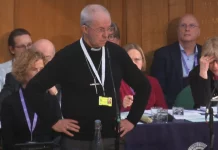Recently, the Church of England General Synod voted (by a very narrow majority) to allow a trial of prayers to bless same-sex relationships. This compromise, a typical Anglican fudge, has, unsurprisingly, satisfied no one.
On the one hand, many evangelicals believe it amounts to a rejection of biblical authority and the authorisation of heresy within the Church. Others do not think it goes far enough, evidence that the Church of England remains institutionally homophobic and abusive towards gay people.
Now, Jayne Ozanne, one of the most vociferous campaigners for the Church to conduct same-sex marriages, has resigned from General Synod. In an interview with Pink News she said that she “can no longer in all conscience stay in an institution which continues to condone the abuse of [LBGT+] people.”
Critiquing the trial of prayers of blessing, she called it “a very small, begrudging step” that “doesn’t address the core issue [in the Church], which is whether sex outside of marriage is a salvation issue.”
THE CENTRAL QUESTION
Ozanne has, perhaps unwittingly, crystalised the crucial issue that faces not just the Church of England, but all churches and evangelical Christians. While much of the debate about same-sex relationships focuses on arguments about equality, inclusion, abuse and harm, the root issue is whether sexual behaviour is a salvation issue.
This determines whether attitudes towards same-sex relationships is a secondary matter on which evangelicals can reach different conclusions in conscience, or whether it is a primary issue which determines whether people are to be accepted as Christians at all.
If sex outside of marriage is a salvation issue, it follows that those who engage in such relationships remain under God’s judgement and are excluded from his gracious gift of eternal life. They should not therefore be regarded as members of the Church, and those who encourage such relationships are false teachers who ought to be silenced.
FACING THE TRUTH
I am glad that Ozanne has stated the issue with such clarity, as it is all too easy for evangelicals to avoid the stark reality of what is at stake in this debate. I am also glad that her comment refers to “sex outside marriage” more broadly, because this makes it clear that the issue is not just about gay relationships. But while Ozanne has identified the core question, the fundamental problem remains: How do we answer it?
For many in favour of same-sex relationships, this is a simple matter of equality and justice towards those who are in committed, loving relationships – whether heterosexual or homosexual. The inference is that, since God is love, he must be pleased by all loving human relationships.
But this cannot be the basis for determining what is right and true. Our supreme authority is the Bible, which we believe to be God’s word. To be a Christian is to be someone who submits and surrenders to Jesus as Lord, and therefore seeks to live in obedience to the rule of his word in every aspect of their life.
WHAT DOES THE BIBLE SAY?
When we turn to the Bible, it is unequivocal in its message that sex outside of marriage is a salvation issue. Sex was God’s gift to humanity in creation, but he designed it exclusively for use in the context of marriage between a man and a woman. This is reflected in the Old Testament law, the teaching of Jesus and the New Testament letters.
Sexual immorality, which scholars agree encompasses adultery, prostitution, sex outside of marriage and homosexual sex, is sinful. Those who engage in sexual immorality thereby demonstrate that they are outside of the kingdom of God, the sphere of salvation.
Paul puts it especially clearly in 1 Corinthians 6:9-10: “Or do you not know that wrongdoers will not inherit the kingdom of God? Do not be deceived: Neither the sexually immoral, nor idolaters nor adulterers nor men who have sex with men nor thieves nor the greedy nor drunkards nor slanderers nor swindlers will inherit the kingdom of God.”
This is the consistent with teaching found elsewhere in the New Testament, including 1 Thessalonians 4:3-8 and Revelation 21:8.
Read it all at Premier Christianity










